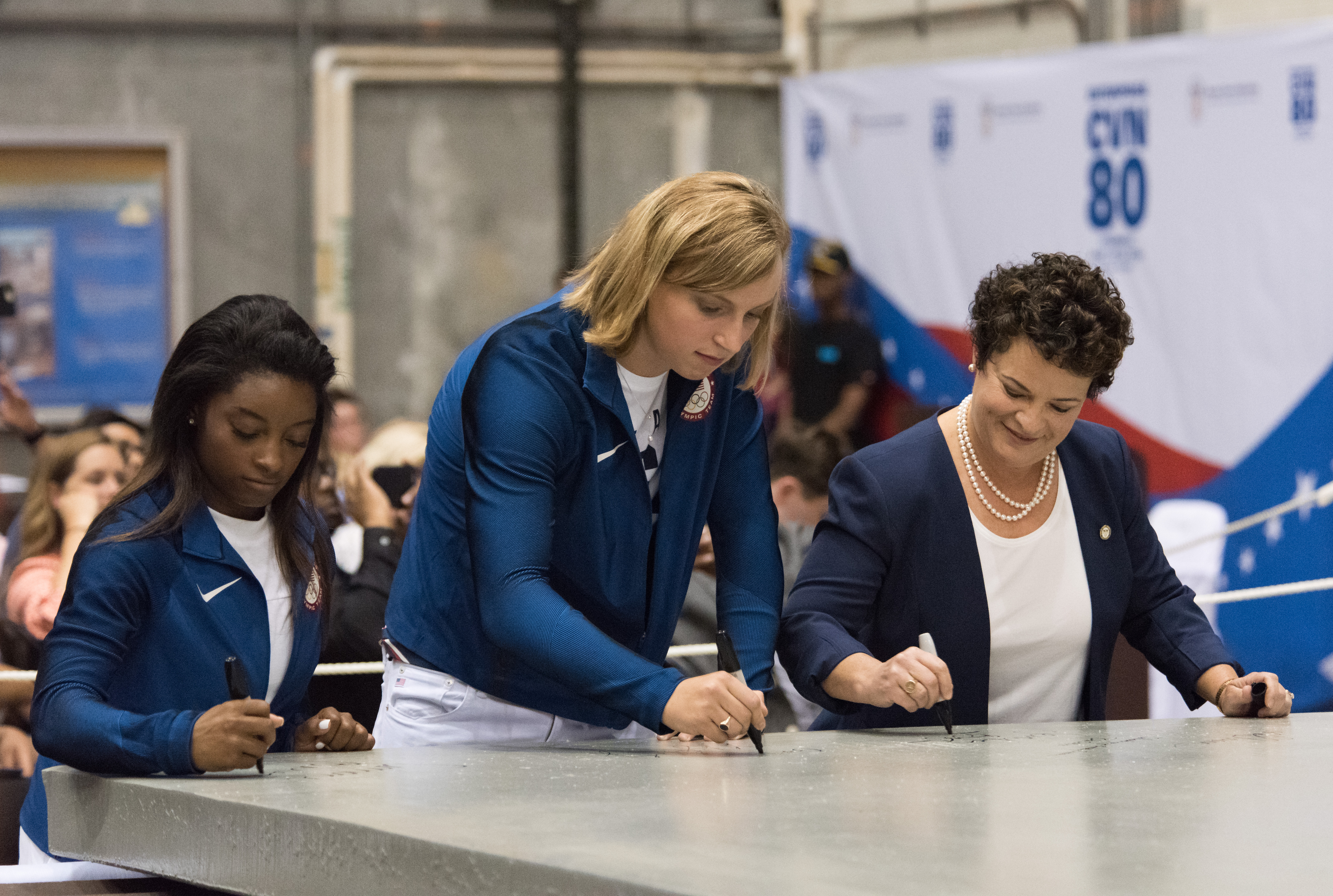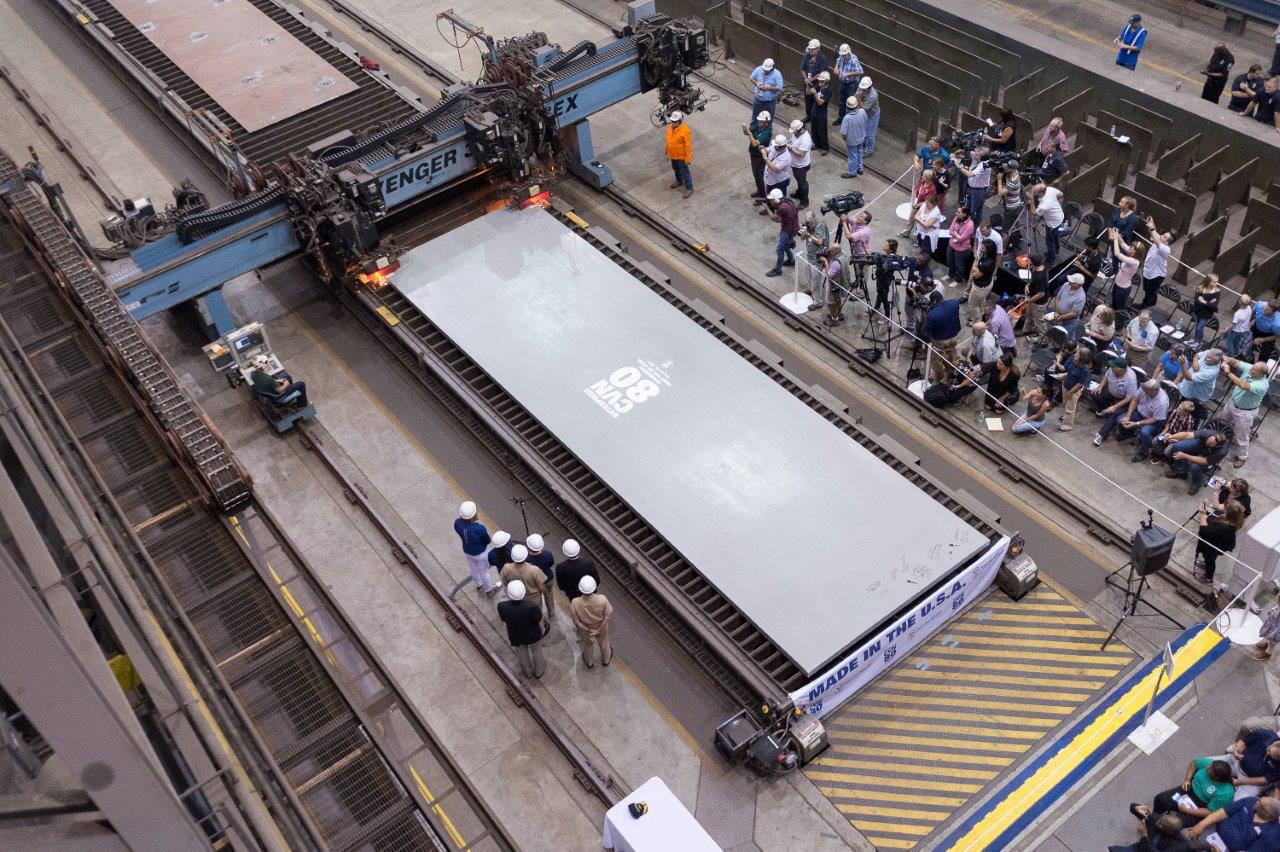
Newport News Shipbuilding cut a 35-ton steel plate to kick off advance construction of the aircraft carrier Enterprise (CVN 80) on Aug. 24, 2017. Ship’s sponsors and U.S. Olympic gold medalists Simone Biles (left) and Katie Ledecky (center), along with Newport News Shipbuilding President Jennifer Boykin (right), signed the steel that will become part of Enterprise’s foundation. Newport News Shipbuilding photo.
The upcoming contract award for the future aircraft carrier Enterprise (CVN-80) will be part of a Defense Department pilot program to award major contracts faster, and Navy leadership is eyeing it as an opportunity to save money by buying two carriers instead of one.
Ellen Lord, under secretary of defense for acquisition, technology, and logistics, said at a recent Senate Armed Services Committee hearing that the Pentagon has launched six pilot programs “that push the limits of our contracting agility … to demonstrate our ability to responsibly reduce this procurement lead time.”
She noted that Defense Secretary James Mattis is particularly interested in reducing acquisition timelines to help improve lethality and readiness in the military. To that end, the six programs selected for this pilot effort will look to have a contract signed within 210 days of the request for proposal being issued, with an ultimate goal of getting major programs on contract within 180 days of the RFP’s release.
The six programs include the CVN-80 aircraft carrier, the Missile Defense Agency’s Standard Missile program, the Air Force’s C-130-J retrofit kits, the Japanese Global Hawk foreign military sales program, and two classified programs.
“Having reviewed data measuring the lead time following validation of a warfighter requirement until the award of the resulting major weapon systems contract, I have concluded that we have the ability to reduce this procurement lead time by as much as 50 percent,” Lord said at the hearing.
“Some of the ways in which we can do this are incentivizing contractors to submit responsive proposals in 60 days or less, and implementing electronic department-wide acquisition streamlining tools.”
The Navy is also eyeing the CVN-80 contract as an opportunity for efficiency – in the service’s case, to save money and time by buying two carriers at once.
Vice Adm. Tom Moore, commander of Naval Sea Systems Command, told USNI News in a Dec. 18 interview that the two-carrier block buy “wouldn’t accelerate the delivery date of 80, but it would allow us to go buy material for 80 and 81 at the same time.”
“It would allow us to get 81 quicker, so it would allow us to get to 12 carriers quicker than we would today,” he added.

Newport News Shipbuilding cut a 35-ton steel plate to kick off advance construction of the aircraft carrier Enterprise (CVN 80) on Aug. 24, 2017. Newport News Shipbuilding photo.
Navy leaders have long advocated buying ships as part of multiyear procurement contracts or block buys, which allow the Navy to save 10 percent or more on cost, as prime contractors can plan for stable production and the supply chain can project demand out for several years. Talk of buying Enterprise and the unnamed CVN-81 together began in earnest in the spring of 2016 and have since picked up steam. Moore said Navy Secretary Richard V. Spencer has expressed “the desire to get a two-ship buy for CVN-80 and 81” since taking over the department in August, and “we obviously think things like that are beneficial to the industrial base and generates some significant savings for the Navy.”
“The Navy is a big proponent of it,” Moore said.
“We’ll see how it goes with the budgeting process, but the Navy has made I think a pretty compelling case why that would be good for us, and again both the [chief of naval operations] and the secretary of the Navy have said they are all for it, so that’s good enough for me.”
With aircraft carriers currently being built five years apart – though industry wants to move to four years apart or less – and the future carriers costing around $11.5 billion apiece, it is much harder for the Navy to buy aircraft carriers in bulk compared to destroyers, submarines, Littoral Combat Ships and other smaller warships.
Still, Moore said, “the facts are pretty clear: when we’ve had a chance to do two-ship buys on the carrier side, with CVN-72 and 73 and then again with 74 and 75, in terms of the total cost performance of the ships and the number of man-hours it took to build those ships, within the Nimitz-class those four ships were built for the fewest man-hours and the lowest cost. So you’re clearly getting benefit out of that, but you have to balance it against the other competing needs of the budget.”
The CVN-80 construction contract is expected to be awarded to Newport News Shipbuilding in Fiscal Year 2018, the current fiscal year.
During the SASC hearing, Lord talked about Pentagon leadership’s interest in smarter acquisition and her view of how the Defense Department could help the services achieve that.
She noted the National Defense Authorization Acts for Fiscal Years 2016 and 2017 “provided the direction and the tools for the department to advance the capabilities required to restore our overmatch, speed the rate at which we field these advanced capabilities, and improve the overall affordability of our fighting forces’ weapon systems.”
“Using an industry analogy, I believe the [Office of the Secretary of Defense] should function as a corporate office: very lean, enabling the services as businesses to execute programs they are responsible for,” she said. Lord comes to the Pentagon from industry, where she most recently served as president and chief executive officer of Textron Systems Corporation.
“[Acquisition, Technology and Logistics] should be pushing the majority of the department’s work back to the services and focusing on prototyping and experimentation, developing architectures and standards, interpreting law into policy and procedures, and simplifying acquisition processes to quickly and cost-effectively provide material and services to the warfighter. Stating it plainly, AT&L needs to be the strategic body with focus across the board driving affordability and accountability, reducing timelines and equipping the services to execute their programs.”
